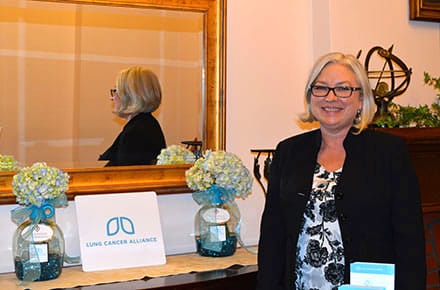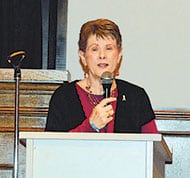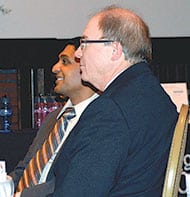
“I was told the cancer I have was incurable and inoperable,” she said. “That was two years ago and during that time, except for a surgery I had for a blood clot, I have not been sick and have had zero pain.” But more importantly, she says, she’s still here.
Moore credits the drug Tarceva® that she was taking, but even more the grace of God.
“This cancer normally doesn’t behave very well, but God is in control and it has not metastasized anywhere,” the 71-year-old marveled. “It’s still just in my left lung and was shrinking some until September.”

“It’s too soon to know if it is working and they will check again in February to see,” she explained. In the meantime she will receive infusions every two weeks at the Gwinnett Medical Center (GMC) Cancer Institute.
Moore has a lot to say about her disease, her treatments and her medical team, so on November 3, for the third year in a row, she was one of the featured speakers at the Lung Cancer Alliance (LCA) Shine a Light event hosted by the GMC Cancer Institute. Held at the Gwinnett Historic Courthouse, GMC has coordinated the event for the past three years to recognize Lung Cancer Awareness Month and to help promote more understanding about lung cancer, mesothelioma and reducing the stigma associated with the disease.
According to LCA, mesothelioma is all too often miscategorized as a lung cancer, but is a different, and perhaps even a more fatal cancer than lung cancer. While mesothelioma often develops in the lining of the lung, abdomen or heart, lung cancer develops inside the lung itself. Even though, mesothelioma and lung cancer are two separate types of cancers, they both may occur because of exposure to asbestos.
GMC’s Thoracic Oncology Nurse Navigator Nancy McCormick learned about Shine a Light from the LCA website after applying for and receiving a Lung Cancer Center of Excellence designation for GMC from the organization. She learned from the LCA how to hold the event and organized Gwinnett’s first one in 2014.
“Shine a Light was founded eight years ago by a lung cancer survivor and caregiver and is the largest coordinated awareness event for lung cancer in the United States,” she explained. “This year on November 3, we joined 200 communities across the country in partnership with the LCA to provide hope, inspiration and support for those impacted with the disease.”

After hearing from patients and oncologists the lights went out and all in the room lit a light for hope and inspiration. “This is a beautiful tribute to all affected by lung cancer – loved ones, friends and those in the room,” McCormick said.
Through the event, national organizers also want survivors and caregivers to more easily add their voice to their national movement for lung cancer.
“What a lot of people don’t know is that lung cancer is the number one cancer killer of both men and women in the United States,” McCormick stated.
And, she added, like Moore, you don’t have to smoke to get lung cancer. Second-hand smoke and exposure to asbestos cause lung cancer and mesothelioma, respectively.
McCormick has worked with Moore to help her navigate through information and resources available to her as a patient in the areas of education, nutrition and information on the cancer support center at GMC. Moore has been amazed at the support from those at the Cancer Institute.
“As many people as go in and out there – they always know your name,” she exclaimed. “It blows my mind! They are friendly and you can tell they love what they’re doing.
“And ‘Dr. K’ – his name is too hard to say so he says just call him ‘Dr. K’ – I’ve been comfortable with him from the beginning and I love his positive outlook. He told me that if I had been diagnosed 15 years ago the outcome would not have been the same, but due to today’s research, cancer is no longer a death sentence.
“I have lung cancer because when I grew up everyone smoked so I lived in a smoke-filled environment. But when I tell my story, it’s a positive one: just because you’ve been diagnosed with cancer doesn’t mean you sit back and do nothing. I’ve been positive throughout the whole process and believe something good will come out of all this.
“I have cancer, cancer doesn’t have me and I get my strength through God,” she shared. “My cancer journey has been good and it has made me more aware of myself and my surroundings. I’m truly blessed and each day is a new day and a new beginning.”
Moore’s caregiver was her 91-year-old mother until she recently had to have surgery. Now Moore is taking care of her mom.
“We are caregiving each other. It’s what keeps us going,” she said.
“We’ll get though this.”

